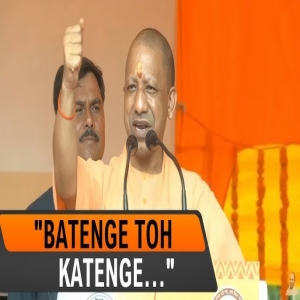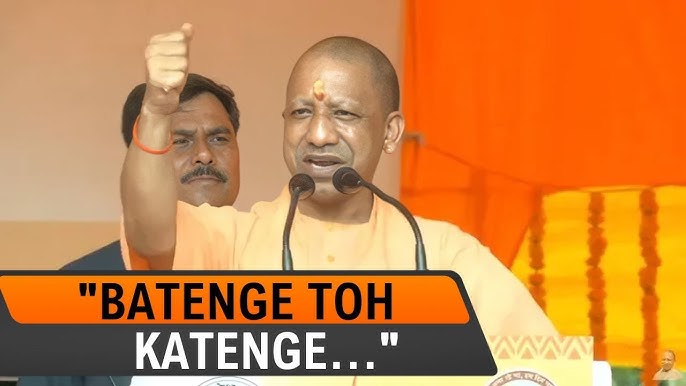
.png) Ram Puniyani
Ram Puniyani

India's anti-colonial struggle was accompanied by diverse social phenomena. One significant phenomenon was the 'Hindu-Muslim' unity and the emergence of the overarching Indian identity amongst people of all religions. The national, anti-colonial stream promoted this, and the best embodiment of this was Mahatma Gandhi, who took three bullets to his bare chest in striving for this. He wrote, "The union that we want is not a patched-up thing but a union of hearts based upon a definite recognition of the indubitable proposition that Swaraj (self-rule) for India must be an impossible dream without an indissoluble union between the Hindus and Muslims of India. It must not be a mere truce. It cannot be based on mutual fear. It must be a partnership between equals, each respecting the religion of the other."
In contrast to this, the religious streams disguised as nationalism not only kept aloof from the anti-colonial struggle but also sowed the seeds and nurtured the plants of hate and divisiveness. Golwalkar, the second Sarsanghchalak of RSS, wrote, "German race pride has now become the topic of the day. To keep up the purity of the Race and its culture, Germany shocked the world by her purging the country of the Semitic Races—the Jews. Race pride at its highest has been manifested here. Germany has also shown how well-nigh impossible it is for races and cultures, having differences going to the root, to be assimilated into one united whole, a good lesson for us in Hindustan to learn and profit from." (We, or Our Nationhood Defined, Nagpur: Bharat Publications, 1939). This set the tone for RSS to propagate hate against Muslims and Christians in India.
This hate was a marginal tendency for decades but has emerged as the dominating 'social common sense' leading to a series of anti-Muslim violence, intimidation, lynching and whatnot, leading to relegating them to a secondary position in society. The process is still on, and different RSS-BJP leaders have used all their 'innovation' to create more hatred; they have kept adding catchy slogans demonising Muslims. 'They can be identified by their clothes,' 'Shamshan-Kabristan,' and the series of Jihads, with 'vote jihad' probably the latest among them. There is a long list of these. To cap it all, two of their top leaders have recently peaked this phenomenon.
One of them is Giriraj Singh, who leads the hate promoters pack. Recently, he stated, "If a Muslim/ghuspetiya (infiltrator) slaps you once, everyone should come together and slap him 100 times... Keep a sword, spear and trident in the house, worship it, and if someone comes, protect yourself from him..."
One is reminded of the father of the nation, who said that if someone slaps you on one cheek, you should put forward the other cheek. The two ideologies of Gandhi's Indian nationalism, amity and love, are being totally countered by the ideology of Hindu nationalism by provoking violence and hate. The downslide of amity and rise of hate have run parallel with the divisive politics of sectarian nationalism, particularly after the demolition of the Babri mosque, followed by a series of divisive campaigns. With the BJP coming to power at the centre, the various wings of RSS and foot soldiers of divisive nationalism have felt that now they can enjoy impunity to the fullest extent.
Around this time, another divisive leader, Yogi Adityanath, the introducer of "Bulldozer (in)Justice," has also thrown up the phrase "Batenge to Katenge," i.e. Hindus should remain united, or else they will be slaughtered. This slogan has various dimensions, and the apex organisation of Hindu nationalism has approved it. The Rashtriya Swayamsevak Sangh on Saturday (October 26, 2024) backed Uttar Pradesh Chief Minister Yogi Adityanath's controversial remark — 'batenge to katenge,' claiming that Hindus 'will be slaughtered if divided' — with RSS general secretary Dattatreya Hosabale saying that the slogan, calling for unity among Hindus, is the lifetime pledge of the Sangh.
This has multiple dimensions. One is that RSS strategists feel that the decline of BJP fortunes in the last Lok Sabha elections was due to a shift of Dalit votes to the INDIA coalition, which stood solidly with the concept of social justice and demanded a caste-based census. The threat that if Dalit-OBC goes to the INDIA coalition, Hindus will be slaughtered! By whom? As per this slogan, it will be by the Muslims.
On the contrary, they have been in the lurch for 75 years. The RSS Combine loves to prop up the contextually inapplicable example of the plight of Hindus in Bangladesh after the uprising (2024). Pakistan is always an evergreen (pun intended) example of the worsening plight of Hindus there.
The freedom movement's central plank was "We must unite as Indians." "Indian" was the core theme of our unity during the anti-colonial struggle, and it is reflected in our Constitution. Gandhi, the most outstanding Hindu of the 20th Century, never called for unity as Hindus. Neither did Maulana Azad or Khan Abdul Gaffar Khan call for unity as Muslims.
For the BJP, which is not concerned about the welfare of the 'person standing last in line,' all its ideology, actions and utterances are contrary to what united India. It ridicules Rahul Gandhi's (RG) call for 'Mohabbat ki Dukan' (Shop of love) and questions why Rahul Gandhi does not meet RSS. The counter question is, why does RSS want to meet RG? RSS knows its politics is based on Hate (Muslims, Christians and those opposed to Hindu Nationalism), while RG is trying to put life back into the Indian National ethos of love and amity as underlined in our Constitution. Why should RG be interested in ideologues against whose ideology he is trying to raise his voice?
If RSS wants RG to meet RSS, it has to drastically change its ideology of division and adopt the values of the Indian Constitution, the core of which is unity as Indians and fraternity between people irrespective of their religion. It is precisely for this reason that Nehru, Gandhi's disciple, never gave importance to RSS, it is for this reason that Indira Gandhi refused to concede RSS Chief Balasaheb Deoras's request to meet her. As per its character, RSS wants to derive its legitimacy even from those who oppose its politics.